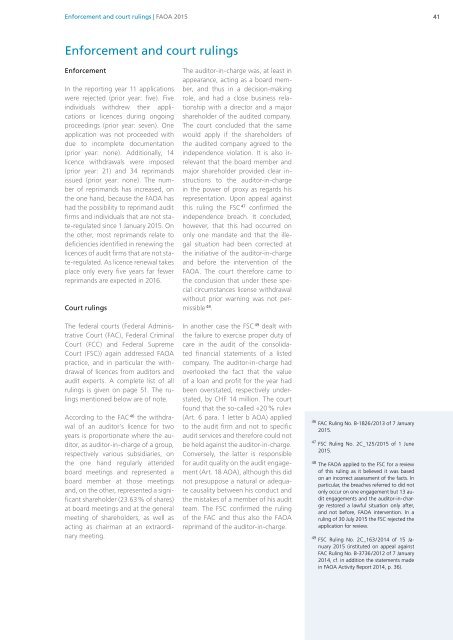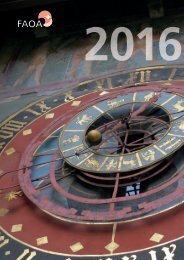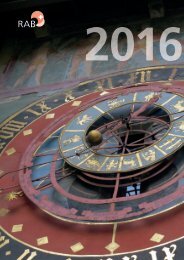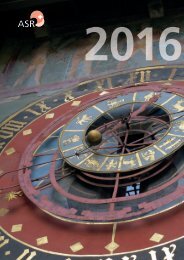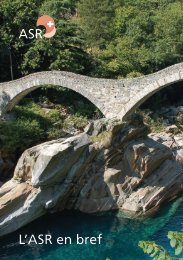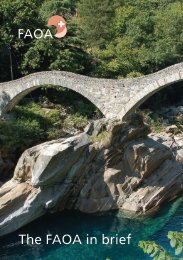Activity Report 2015
Activity Report 2015 - Federal Audit Oversight Authority FAOA
Activity Report 2015 - Federal Audit Oversight Authority FAOA
Create successful ePaper yourself
Turn your PDF publications into a flip-book with our unique Google optimized e-Paper software.
Enforcement and court rulings | FAOA <strong>2015</strong> 41<br />
Enforcement and court rulings<br />
Enforcement<br />
In the reporting year 11 applications<br />
were rejected (prior year: five). Five<br />
individuals withdrew their applications<br />
or licences during ongoing<br />
proceedings (prior year: seven). One<br />
application was not proceeded with<br />
due to incomplete documentation<br />
(prior year: none). Additionally, 14<br />
licence withdrawals were imposed<br />
(prior year: 21) and 34 reprimands<br />
issued (prior year: none). The number<br />
of reprimands has increased, on<br />
the one hand, because the FAOA has<br />
had the possibility to reprimand audit<br />
firms and individuals that are not state-regulated<br />
since 1 January <strong>2015</strong>. On<br />
the other, most reprimands relate to<br />
deficiencies identified in renewing the<br />
licences of audit firms that are not state-regulated.<br />
As licence renewal takes<br />
place only every five years far fewer<br />
reprimands are expected in 2016.<br />
Court rulings<br />
The federal courts (Federal Administrative<br />
Court (FAC), Federal Criminal<br />
Court (FCC) and Federal Supreme<br />
Court (FSC)) again addressed FAOA<br />
practice, and in particular the withdrawal<br />
of licences from auditors and<br />
audit experts. A complete list of all<br />
rulings is given on page 51. The rulings<br />
mentioned below are of note.<br />
According to the FAC 46 the withdrawal<br />
of an auditor’s licence for two<br />
years is proportionate where the auditor,<br />
as auditor-in-charge of a group,<br />
respectively various subsidiaries, on<br />
the one hand regularly attended<br />
board meetings and represented a<br />
board member at those meetings<br />
and, on the other, represented a significant<br />
shareholder (23.63% of shares)<br />
at board meetings and at the general<br />
meeting of shareholders, as well as<br />
acting as chairman at an extraordinary<br />
meeting.<br />
The auditor-in-charge was, at least in<br />
appearance, acting as a board member,<br />
and thus in a decision-making<br />
role, and had a close business relationship<br />
with a director and a major<br />
shareholder of the audited company.<br />
The court concluded that the same<br />
would apply if the shareholders of<br />
the audited company agreed to the<br />
independence violation. It is also irrelevant<br />
that the board member and<br />
major shareholder provided clear instructions<br />
to the auditor-in-charge<br />
in the power of proxy as regards his<br />
representation. Upon appeal against<br />
this ruling the FSC 47 confirmed the<br />
independence breach. It concluded,<br />
however, that this had occurred on<br />
only one mandate and that the illegal<br />
situation had been corrected at<br />
the initiative of the auditor-in-charge<br />
and before the intervention of the<br />
FAOA. The court therefore came to<br />
the conclusion that under these special<br />
circumstances license withdrawal<br />
without prior warning was not permissible<br />
48 .<br />
In another case the FSC 49 dealt with<br />
the failure to exercise proper duty of<br />
care in the audit of the consolidated<br />
financial statements of a listed<br />
company. The auditor-in-charge had<br />
overlooked the fact that the value<br />
of a loan and profit for the year had<br />
been overstated, respectively understated,<br />
by CHF 14 million. The court<br />
found that the so-called «20% rule»<br />
(Art. 6 para. 1 letter b AOA) applied<br />
to the audit firm and not to specific<br />
audit services and therefore could not<br />
be held against the auditor-in-charge.<br />
Conversely, the latter is responsible<br />
for audit quality on the audit engagement<br />
(Art. 18 AOA), although this did<br />
not presuppose a natural or adequate<br />
causality between his conduct and<br />
the mistakes of a member of his audit<br />
team. The FSC confirmed the ruling<br />
of the FAC and thus also the FAOA<br />
reprimand of the auditor-in-charge.<br />
46 FAC Ruling No. B-1826/2013 of 7 January<br />
<strong>2015</strong>.<br />
47 FSC Ruling No. 2C_125/<strong>2015</strong> of 1 June<br />
<strong>2015</strong>.<br />
48 The FAOA applied to the FSC for a review<br />
of this ruling as it believed it was based<br />
on an incorrect assessment of the facts. In<br />
particular, the breaches referred to did not<br />
only occur on one engagement but 13 audit<br />
engagements and the auditor-in-charge<br />
restored a lawful situation only after,<br />
and not before, FAOA intervention. In a<br />
ruling of 30 July <strong>2015</strong> the FSC rejected the<br />
application for review.<br />
49 FSC Ruling No. 2C_163/2014 of 15 January<br />
<strong>2015</strong> (instituted on appeal against<br />
FAC Ruling No. B-3736/2012 of 7 January<br />
2014, cf. in addition the statements made<br />
in FAOA <strong>Activity</strong> <strong>Report</strong> 2014, p. 36).


